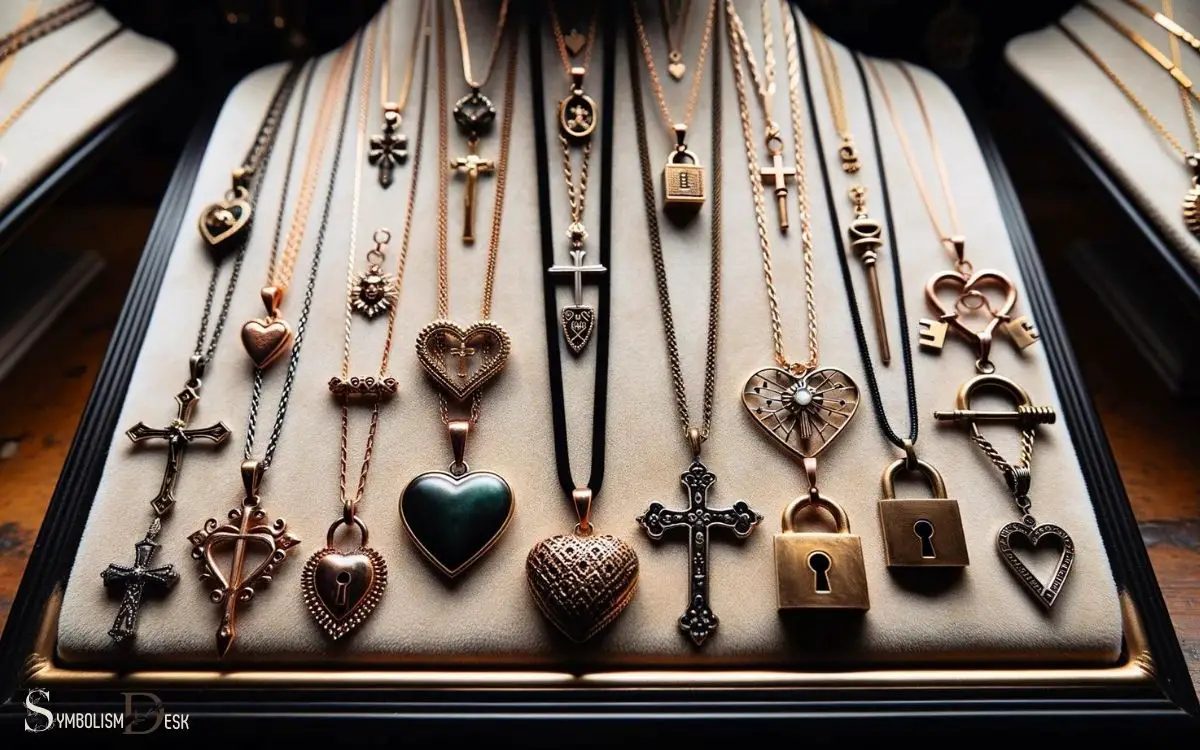What Are the Symbolic Meanings of Necklace: Affection!
Necklaces carry a multitude of symbolic meanings, ranging from wealth and social status to spirituality and protection. In modern times, they also represent personal style and affection.
The symbolism of necklaces is as diverse as the cultures that cherish them:
- Historical Significance: In ancient Egypt, necklaces were adorned with amulets believed to protect the wearer. The Greeks and Romans valued them for both beauty and the display of wealth.
- Spirituality: Many cultures use necklaces to signify spiritual beliefs, such as the cross in Christianity or the mala beads in Buddhism.
- Social Status: Precious metals and gemstones in necklaces often denote high social standing and wealth.
- Personal Connection: Necklaces are commonly given as gifts to signify love and are sometimes passed down as heirlooms, carrying sentimental value.
Discover the layered meanings behind each necklace, from timeless tokens of love to emblems of faith and status.

Key Takeaway
Historical Symbolism of Necklaces
The historical symbolism of necklaces has often been overlooked, despite frequently appearing in various cultures and periods throughout history.
Necklaces have held significant cultural, social, and personal meanings, serving as status symbols, protective talismans, and markers of identity.
In ancient Egypt, necklaces were seen as symbols of wealth and status, often adorned with amulets for protection and religious significance.
In ancient China, jade necklaces symbolized prosperity, health, and protection. In the European Middle Ages, necklaces were worn as a symbol of religious affiliation or as protective amulets.
The symbolism of necklaces has evolved over time, reflecting the values and beliefs of each culture. Understanding the historical context of necklaces provides insight into their enduring significance and their role in shaping human history, customs, and traditions.
This historical context seamlessly leads us into the spiritual significance of necklaces.
Spiritual Significance of Necklaces
The spiritual significance of necklaces extends across various cultures and religions, with necklaces often serving as amulets believed to offer protection and guidance.
Different materials and designs hold specific cultural and spiritual meanings, representing values, traditions, and beliefs.
Understanding the spiritual significance of necklaces provides insight into the deep-rooted connections between individuals, their spirituality, and the adornments they wear.
Necklace as Amulet
Exploring the spiritual significance of necklaces reveals their role as amulets in various cultures and belief systems.
Necklaces have been worn for centuries as protective talismans, believed to ward off evil spirits, bring good fortune, or provide spiritual guidance.
In many cultures, specific symbols or gemstones are chosen for their perceived metaphysical properties, imbuing the necklace with protective or healing powers.
For example, the ancient Egyptians adorned themselves with amulet necklaces featuring symbols like the Ankh or the Eye of Horus to protect the wearer from harm.
In Hinduism, the wearing of a rudraksha bead necklace is believed to provide spiritual benefits and protection. Similarly, Native American tribes use necklaces adorned with specific animal totems for spiritual guidance and protection.
Across diverse belief systems, necklaces serve as tangible expressions of spiritual faith and protection.
Cultural and Religious Significance
Necklaces hold significant cultural and religious importance, serving as tangible expressions of spiritual faith and protection across diverse belief systems. In various cultures, necklaces are adorned with symbols and motifs that carry deep spiritual meanings.
For example, in Hinduism, the ‘mangalsutra’ necklace symbolizes the sacred bond of marriage and is believed to protect the husband. In Christianity, the cross necklace represents the crucifixion of Jesus Christ and serves as a reminder of faith and salvation.
Similarly, in Buddhism, the ‘mala’ necklace is used for meditation and prayer, with each bead representing a mantra or a sacred intention.
Across cultures, necklaces are worn during religious ceremonies and rites, signifying devotion and connection to the divine. The act of wearing a necklace can be a powerful spiritual practice that fosters a sense of protection, guidance, and reverence.
Cultural Representations Through Necklaces
Necklaces hold immense cultural significance, serving as powerful symbols that communicate a wide array of messages about identity, status, and beliefs.
In various cultures, necklaces are adorned with specific symbols, colors, and materials that reflect cultural narratives and traditions.
For example, in some African cultures, beaded necklaces are used to communicate social and marital status, while in Native American cultures, intricately designed turquoise necklaces symbolize protection and healing.
In Asian cultures, jade necklaces are believed to bring luck and prosperity. These cultural representations through necklaces not only reflect the diversity of traditions and beliefs but also serve as a means of preserving and passing down cultural heritage.
Understanding the cultural representations of necklaces provides insight into the rich tapestry of human civilization and the stories it weaves.
This understanding sets the stage for exploring the deeply personal and emotional connections individuals have with their necklaces.
Personal and Emotional Connections to Necklaces
Personal and emotional connections to necklaces often hold deep sentimental meanings, with many individuals cherishing necklaces as family heirlooms passed down through generations.
These pieces of jewelry can symbolize the strong bonds and memories shared among family members, evoking a sense of love, tradition, and history.
Understanding the personal significance of necklaces can provide insight into the emotional connections people have with these adornments.
Sentimental Necklace Meanings
Many people have a deep emotional attachment to their necklaces, often forming strong sentimental connections to these cherished pieces of jewelry. Necklaces can hold great personal significance, representing love, memories, and milestones in one’s life.
The table below illustrates some common sentimental meanings associated with necklaces:
| Sentimental Meaning | Description |
|---|---|
| Love | Necklaces received as tokens of love and affection |
| Memories | Lockets or pendants containing photos or mementos |
| Milestones | Commemorating special events or achievements |
| Remembrance | Keeping the memory of a loved one close |
| Empowerment | Symbolizing strength, resilience, or overcoming obstacles |
These emotional connections make necklaces more than just accessories, often turning them into cherished keepsakes with profound personal significance.
Moving forward, let’s delve into the significance of family heirlooms as expressed through necklaces.
Family Heirloom Significance
The significance of family heirlooms expressed through necklaces is often rooted in the continuation of sentimental connections and the preservation of cherished memories.
Family heirloom necklaces carry a profound personal and emotional significance, representing the enduring bonds between generations. These necklaces serve as tangible links to the past, embodying the traditions, values, and legacies of one’s family.
The act of passing down a necklace from one generation to another symbolizes the transference of love, wisdom, and heritage.
Each worn pendant or delicate chain holds a narrative of the lives and experiences of those who have come before, fostering a profound sense of belonging and identity.
Family heirloom necklaces not only adorn the body but also encapsulate the essence of one’s lineage, fostering a deep and enduring connection to one’s roots.
Social Status and Identity Reflected in Necklaces
Reflecting social status and identity, necklaces serve as significant markers of individual belonging and distinction in various cultures and societies.
They convey a person’s social standing, tribal affiliation, or marital status, and are often worn during ceremonial events, such as weddings or religious rites.
The design, material, and adornments of a necklace can communicate intricate details about a person’s place within a community and their life journey.
In some cultures, specific necklaces are reserved for esteemed members or leaders, signifying authority and respect. Conversely, certain necklaces may denote coming-of-age or initiation into adulthood.
The symbolism attached to necklaces underscores their role as more than mere accessories; they encapsulate the complex tapestry of social structure, tradition, and personal identity.
Can a Necklace Symbolize Patience as Well?
Yes, a necklace can symbolize patience as well, just like the symbolic meaning of spider. The spider is known for its patience in weaving intricate webs, representing patience and perseverance. Similarly, a necklace can be a reminder to be patient and stay strong during challenging times.
Modern Interpretations of Necklace Symbolism
In contemporary society, the symbolic significance of necklaces continues to evolve, reflecting shifting cultural values and individual expressions of identity and belonging.
Modern interpretations of necklace symbolism often center around personal empowerment, self-expression, and meaningful connections.
Many individuals use necklaces as a form of self-expression, choosing pieces that resonate with their personal values, beliefs, and experiences. For some, wearing a particular necklace may symbolize a commitment to a cause or a reminder of a significant life event.
Additionally, in a globalized world, necklaces can represent cross-cultural connections and inclusivity, with individuals embracing jewelry that reflects diverse cultural traditions.
Furthermore, the trend of layering multiple necklaces allows for creative and personalized expressions of style and symbolism, further contributing to the evolving modern interpretations of necklace symbolism.
Conclusion
In conclusion, the symbolic meanings of necklaces have evolved over time, carrying historical, spiritual, and cultural significance.
They also hold personal and emotional connections for individuals, reflecting social status and identity.
Modern interpretations of necklace symbolism continue to emphasize their importance in expressing individuality and personal style.
The necklace is truly a timeless and invaluable accessory, with a depth of meaning that transcends generations.







